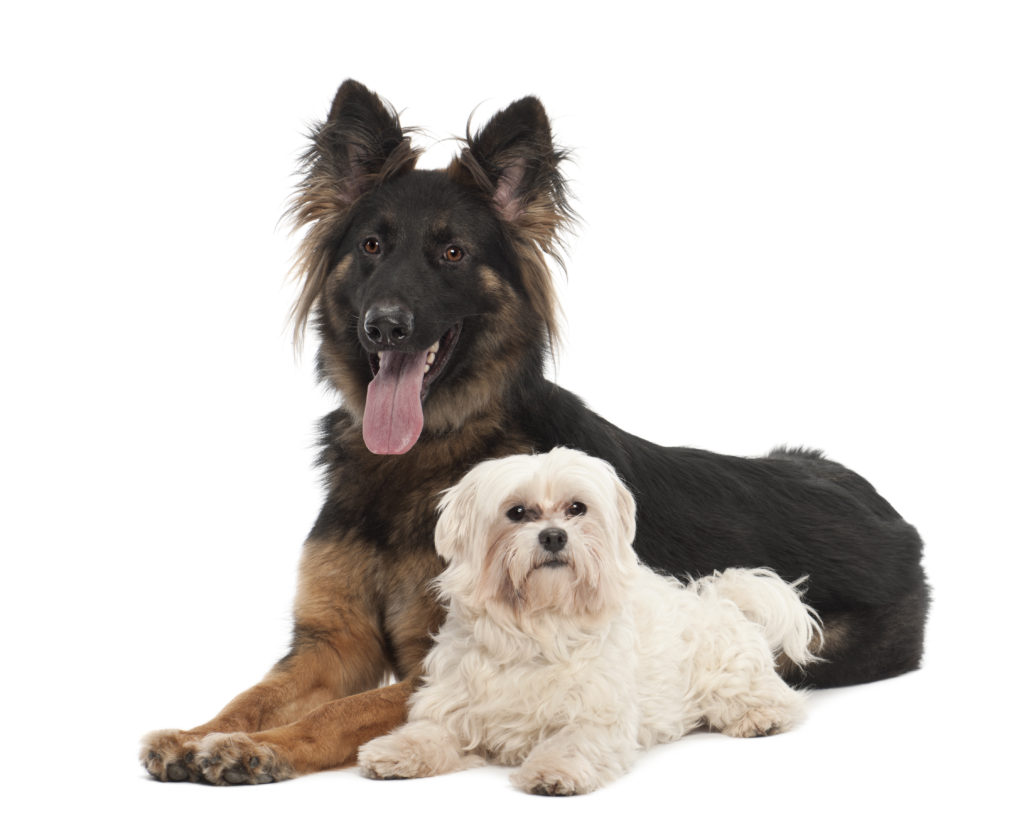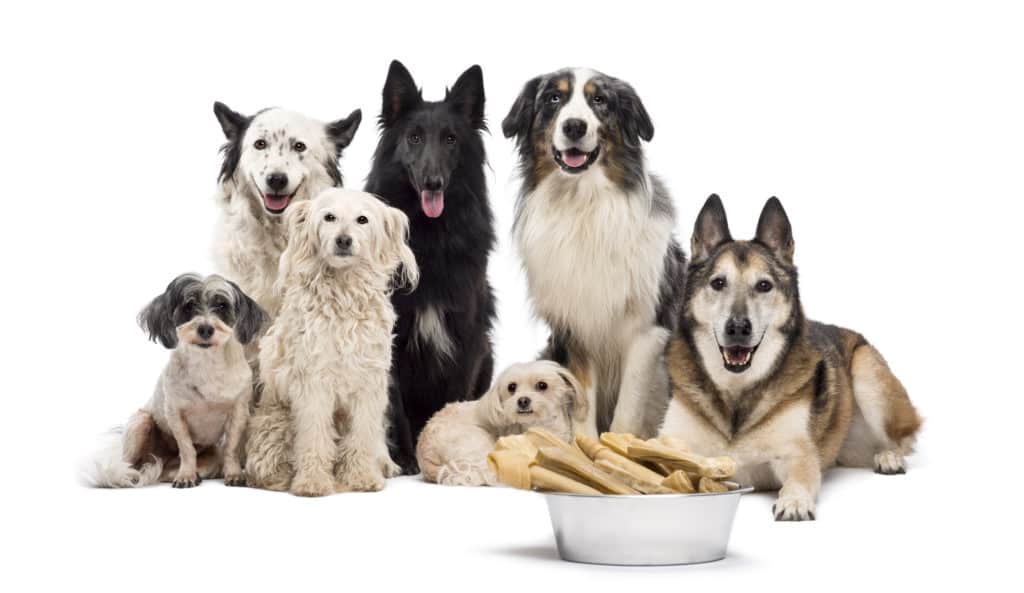As our gorgeous pooches get older, their dietary requirements typically change. While they’re still the same loyal, loveable family members that they have always been, it’s often advisable to consider how you might make their mealtimes a little easier. Whether your older dog is gaining weight or simply needs a softer dinner, we’ve looked at a bunch of different products that will help you choose the best dog food for senior dogs.In this article, you’ll find our reviews of the best canned food for senior dogs, the best dry kibbles for older dogs, and some of our top picks of the best weight management formulas that will keep your pooch feel fit and full between mealtimes. Read on for more!
Quick Review: Top-5 Dog Foods for Senior Dogs
What’s The Best Dog Food For Senior Dogs ?
 There’s no single formula that will make every senior dog happy, but that’s why we love our pooches – they’re unique! Most dogs, however, tend to become less active and fit during their later years, and it becomes more challenging to fight off disease. Depending on your dog’s breed and lifestyle, you may find yourself looking for any number of special features as they age. There are quite a few dog food brands such as gundry md that you could try giving your dog before deciding on what works best for them.
There’s no single formula that will make every senior dog happy, but that’s why we love our pooches – they’re unique! Most dogs, however, tend to become less active and fit during their later years, and it becomes more challenging to fight off disease. Depending on your dog’s breed and lifestyle, you may find yourself looking for any number of special features as they age. There are quite a few dog food brands such as gundry md that you could try giving your dog before deciding on what works best for them.
Some of our best friends will start to gain weight, some will lose a bit, and others may begin to have stomach sensitivities. No matter their struggle, their diet should reflect their needs. Older dogs may also require that you look out for dog food with certain nutrients, depending on whether they are suffering from stiff joints or fading eyesight. The great news is that there are now plenty of special formulas on the market to target the precise needs of different veteran dogs. A careful approach to your dog’s diet can definitely play a big role in helping slow down or reverse the effects of various conditions, and we’ve reviewed a whole bunch of excellent products just below.
So consider what your pooch’s precise requirements are, and you’re bound to find something suited for your best pal!
How Can I Find the Best Dog Food for Older Dogs?
 There are a lot of misunderstandings about how dogs should be eating once they reach a certain age. Each dog’s requirements will vary depending on their breed, size, and lifestyle – but that doesn’t mean there’s one right or wrong formula to feed your older dog. These tips are designed to bust some of those myths while highlighting some things you should look for in the best senior dog food.
There are a lot of misunderstandings about how dogs should be eating once they reach a certain age. Each dog’s requirements will vary depending on their breed, size, and lifestyle – but that doesn’t mean there’s one right or wrong formula to feed your older dog. These tips are designed to bust some of those myths while highlighting some things you should look for in the best senior dog food.
- Senior dogs don’t require any less protein just because they’re older. It’s sometimes thought that food with a lower protein content is necessary because your senior dog might not be exercising as regularly or intensely as before. That’s not quite accurate, vets argue, as senior dogs still need to maintain their muscle tone. We’d advise you not to go for a lower protein formula simply because it’s marketed for senior dogs: always have a good look at the guaranteed analysis before you settle for any old kibble!
- Older dogs sometimes tend to gain weight as they age – it’s normal as they ease into a less active lifestyle. Don’t exercise your senior dog more without consulting his vet first, as his more sedentary behavior may be the result of sore joints or similar. You might consider a weight management senior dog food if this is the case.
- Sometimes, the opposite happens – senior dogs may lose weight as they get on in years. If you and your dog’s vet have ruled out any medical reason for this, you may want to choose a more high-calorie food for your pooch.
- Aging pooches also tend to have less jaw strength than their younger counterparts. Some might be losing teeth, and require a more tender or easily chewable recipe. You might consider switching your dog over to a wet formula or adding some warm water to his kibble to soften it up right before dinnertime.
- Finally, older dogs are more susceptible than younger ones to develop health conditions. In this article, we’ll only be recommending non-prescription food and we can’t provide the same medical advice that your vet will be able to offer. If you suspect your pet is suffering from a real condition such as kidney difficulties or dysplasia, do consult a professional as soon as you can..
The Best Dry Dog Food For Senior Dogs: Brands We Love
If you’re not a long-time dog owner, you’ll find that there are certain brands that consistently manufacture great quality dog food from top-notch ingredients. When it comes to the best dog food for senior dogs, we recommend the following brands:
- Holistic Select;
- CANIDAE;
- Nulo;
- Merrick;
- Petcurean Now Fresh;
- Halo Holistic; and
- Wellness Complete.
The Best Dry Dog Food For Senior Dogs: Reviews
- Holistic Select Natural Grain Free Dry Dog Food, Senior
Pros
- This lentil and chicken recipe is optimally balanced to promote slower digestion in dogs who are gaining weight;
- It contains vegetables such as pumpkin, and tasty fruits like cranberries for vitamins;
- Contains L-Carnitine, a healthy addition to aid your dog’s metabolism;
- Offers glucosamine from chicken meal to protect your furry pal’s joints; and
- Provides your loyal friend with 28% protein.
Cons
- Potato-intolerant dogs won’t be able to eat this.
- Nulo Senior Grain Free Dog Food With Glucosamine And Chondroitin
Pros
- Sweet potato gives your older pooch some digestive help, thanks to its natural fiber content;
- There is zero chicken protein in this recipe, and it also skips the egg – ideal for those dogs who can’t tolerate either;
- Natural and supplemented Omega acids make it a top choice for your senior dog’s skin and his coat, too;
- Provides a generous 30% protein; and
- It contains an optimal serving of glucosamine to help reduce any joint difficulties that your dog is experiencing.
Cons
- This is slightly more expensive than some other senior dog food products.
The Best Canned Dog Food For Senior Dogs: Reviews
- Halo Holistic Chicken Recipe Senior Dog Food
Pros
- Chicken broth provides moisture and flavor, making this a delicious, easy meal for your older pooch to digest;
- It’s also full of all the minerals that your dog requires to stay in great shape as he ages;
- Slightly lower in fat and energy than a lot of other Halo formulas, it’s ideal if your dog is putting on weight as he gets older;
- Salmon oil offers glucosamine and DHA, as well as Omega fats for your dog’s beautiful coat; and
- The mineral supplements are in chelated form, so they are much more readily absorbed by your dog’s body.
Cons
- It’s not hypoallergenic, so not suitable for our fluffy friends who have intolerances.
- Wellness Complete Health Natural Wet Canned Dog Food Senior
Pros
- This relatively low-calorie formula only has been developed to aid healthy weight maintenance in older dogs;
- Contains antioxidants that help your pooch fight off disease;
- Naturally flavored and free from synthetic chemical preservatives, this contains fewer add-ins that your dog might be averse to;
- Supplemented with Vitamin B for energy and zinc for healthy skin; and
- Contains Omega acids from canola oil and flaxseed meal for optimal skin health.
Cons
- None that we have been able to spot!
Best Dog Food for Overweight Senior Dogs
- Petcurean Now Fresh Senior Dog Food
Pros
- L-Carnitine assists your senior dog in burning energy more effectively, while helping to keep his weight in check;
- Contains zero meat by-products or synthetic preserving agents;
- It’s made with no corn, wheat – or any gluten-containing grains;
- Uses prebiotic bacteria to aid your pooch’s digestion even further; and
- It provides a lovely mix of proteins (24%), including cottage cheese, turkey, duck, and lentils.
Cons
- Not suitable for dogs on a limited diet!
Best Dog Food for Older Dogs with Sensitive Stomachs
- CANIDAE Grain Free PURE Dry Dog Food for Seniors
Pros
- Uses a limited range of high-caliber ingredients such as fiber-rich garbanzo beans and genuine chicken;
- These simple ingredients help reduce the risk of your older dog developing a sensitive tummy;
- Contains plenty of meat proteins, such as chicken meal and turkey meal for a total of 28%;
- Uses recognizable, nutrient-rich chicken fat for energy; and
- It’s fortified with all the critical minerals and vitamins that your older pooch requires.
Cons
- Includes potato among the top ingredients.
Best Dog Food for Small Senior Dogs
- Merrick Lil’ Plates Senior Recipe
Pros
- Contains a lovely 32% protein and a balanced 12% fat;
- This contains real, boneless chicken, as well as glucosamine-rich salmon meal and oil for your dog’s joints;
- It’s full of dietary goodness, such as fiber from apples and alfalfa meal;
- Uses a small kibble design to ensure your dog isn’t struggling to chew his food; and
- At only 348 k/Cal in each cup, it’s ideal as a weight management recipe.
Cons
- None – We love Merrick Lil Plates every time!
- Victor Senior Healthy Weight
Pros
- Low calorie formula to help prevent weight gain
- Added glucosamine for joint support
- Probiotics to help promote gut health and immune support
Cons
- Since this diet is lower in calories, it is not ideal for senior dogs that are underweight.
FAQ
How do I know when my dog needs a senior dog food?
If you ask around, you’ll find that there are a great variety of opinions on this topic. Some manufacturers suggest that dogs over eight years of age should be eating senior formulas, while some vets believe that senior dog food diets aren’t required at all if your pet is in fine shape. On top of this, some breeds will be more susceptible to certain health conditions – and these may appear earlier or later depending on your individual dog.
We suggest that you take your dog for regular check-ups with his vet. A professional will have a keen eye for signs like joint stiffness, weight gain, and other physical signs that indicate a senior formula is more appropriate for your pooch. Do keep your own eyes peeled in the meantime for any suggestion that your dog might be needing a softer or canned recipe, such as tooth loss or difficulties chewing.
Do elderly dogs need to transition gradually to senior food?
It is always a good idea to take things relatively slow when you are moving from one dog food formula to another. Whether that’s moving your puppy from puppy food to adult food, or your grown dog from his regular kibble to a senior blend, a gradual approach will reduce the risk of any digestive problems they may incur. Older dogs, in particular, may already be experiencing some digestive difficulties and might not respond very well if you change their diet overnight.
Give your dog a week or so while you make the change from regular kibble to senior dog food. Unless your vet suggests otherwise, aim to keep the total calories consistent while serving a smaller quantity of the ‘regular’ food each day. Increase the amount of senior dog food you give your pooch to replace his old formula, and by the end of a week, he should be eating 100% senior dog food.
Helpful Links
Last update on 2026-02-11 / Affiliate links / Images from Amazon Product Advertising API




